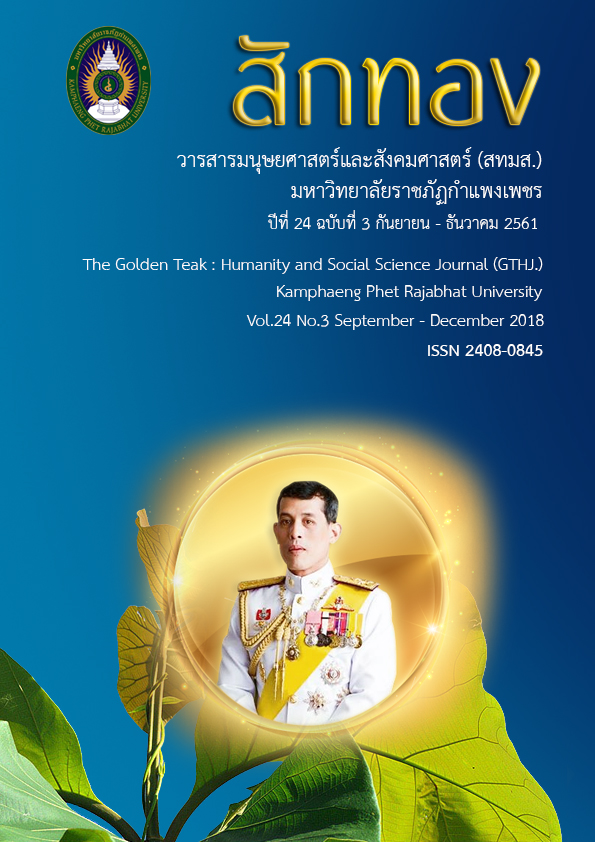The Administration Model Towards Excellence of Expansion Schools under Office of the Basic Education Commission
Main Article Content
Abstract
The objectives of this research were to: analyze the components, create a pattern creation model and evaluate the model of the administration towards excellence of expansion schools under office of the basic education commission. Step 1: The component analysis, the data was the related document and 9 experts. The population and sample were administrators and teachers of expansion schools under the Office of the Basic Education Commission in academic year 2016, totally 167 schools and 4,189 population. The sample was employed by simple random sampling, consisted of 400 people. The instruments were a synthesis note, a semi – structured interview form, and a questionnaire. The statistics were analyzed by using content analysis, frequency, percentage, mean ( ), and standard deviation (S.D). Step 2: The model development, the data was 9 experts for connoisseurship and 9 experts for interview. The instruments were a semi-structured interview form, and a connoisseurship record notes. The data analysis used the content analysis from expert interview, and the data discussion. Step 3: The model evaluation, the data was 9 administrators. The instrument was the valuation form. The statistics were analyzed by using percentage and standard deviation (S.D). The results of the research were as follows: 1) The component analyzing of the administration towards excellence of expansion schools under office of the basic education commission consisted of 6 important components were as follows: (1) Elevation of Achievement (2) Leadership of Administrator (3) Strategic Planning (4) Teacher Potential Development (5) Education Promoting (6) Quality Control, and was at the high level. 2) The presentation of the model transformed into a guideline model of the administration towards excellence of expansion schools under office of the basic education commission found that the 6 components of 43 variables. There are 89 guidelines. 3) The evaluation found that the 6 components was at the high level 3.78 was accepted following criterion: accuracy, appropriateness, feasibility, and utility.
Article Details
บทความที่ได้รับการตีพิมพ์เป็นลิขสิทธิ์ของวารสาร สักทอง : วารสารมนุษยศาสตร์และสังคมศาสตร์ สถาบันวิจัยและพัฒนา มหาวิทยาลับราชภัฏกำแพงเพชร
ข้อคิดเห็นใดๆ ที่ปรากฎในวารสารเป็นวรรณกรรมของผู้เขียนโดยเฉพาะ ซึ่งมหาวิทยาลัยราชภัฏกำแพงเพชรและบรรณาธิการไม่จำเป็นต้องเห็นด้วย
References
Boonyapo, S. (2012). The Administration Model For Excellence Basic Educational School under the Primary Education Service Office. Bangkok : Graduate School SilpaKorn Univeity.
Hankiatpong, S. (2009). An Analysis of Factors Affecting Excellent Administration of Private Kindergartens. Dissertation Doctor of Philosophy Program, Chulalongkorn University.
Ministry of Education. (2009). The Education Reform in the 2nd Decade (2552-2561). Bangkok : Prikwarn Graphic.
Office of the Basic Education Commission. (2002). National Education Act of 2542.Bangkok : Prikwarn Graphic co.ltd.
Office of Nation Education Standards and Quality Assessment (Public Organisation). (2006). The Conclusion for the Administrator to the Effect of the Third External Quality Assessment B.E. 2544-2548. Bangkok : The Office for National Education Standards and Quality Assessment (ONESQA).
Sethaphanit, S. (2007). Development of a School Administrative System for Excellence of a Private School. Dissertation Doctor of Philosophy Program, Chulalongkorn University.
Wongnaya. S. (2016). Strategic Planning Development for Educational Quality Development of Basic Schoolsunder KamphaengPhet Primary Educational Service Area Office. The Golden Teak : Humanity and Social Science Journal, 22(1),41-56.
Wittayanukorn, S. (2009). A Development Model of Educational Management for Excellence in the Private School. Dissertation Doctor of Philosophy Program in Education Administration, Faculty of Education Burapha University.


